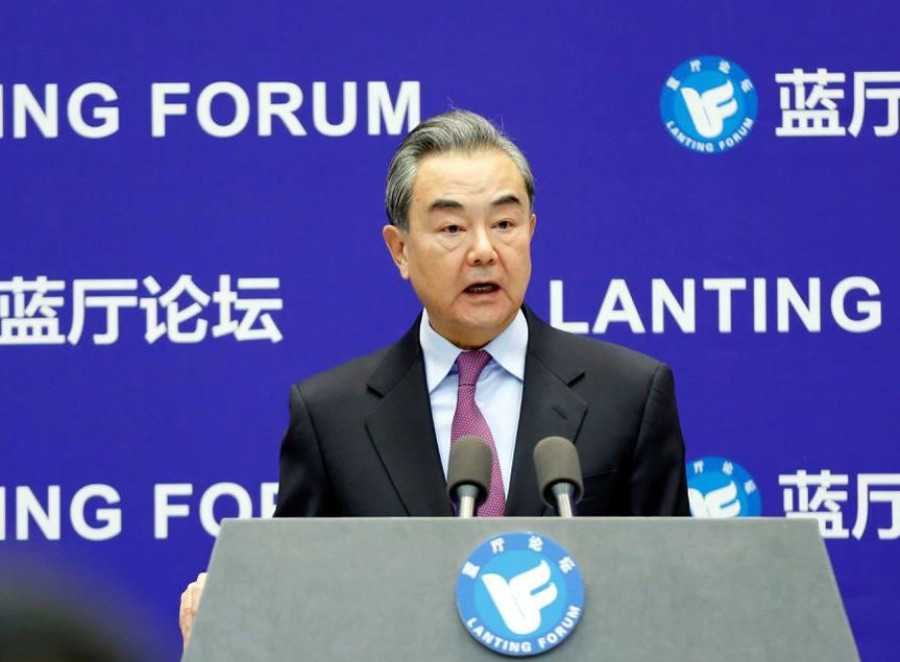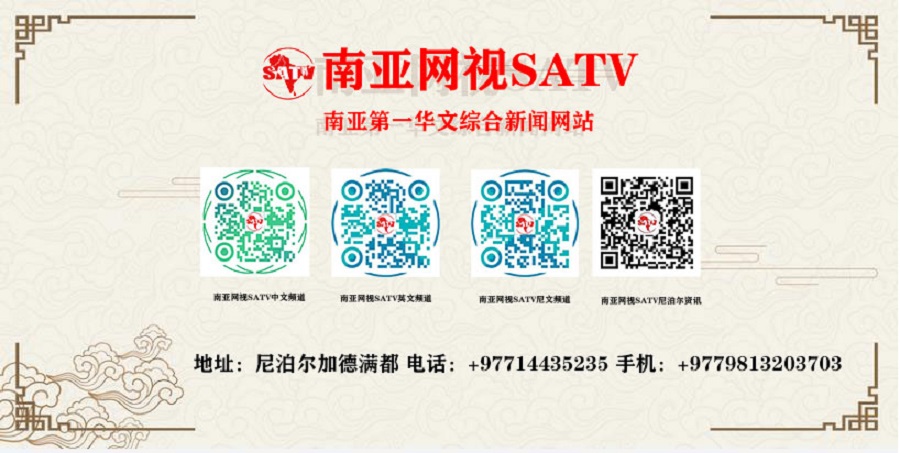
Chinese State Councilor and Foreign Minister Wang Yi delivers a speech at the Lanting Forum in Beijing, China February 22, 2021. Reuters
A day after the Nepal Parliament ratified the Millennium Challenge Corporation Nepal Compact, China reacted on Monday saying that it has noted the ratification and the “interpretive declaration.”
Nepal Parliament on Sunday ratified the MCC Nepal Compact along with a 12-point “interpretive declaration” which according to the leaders incorporated the concerns and apprehensions raised in various political and social circles.
Responding to a question during a regular press briefing in Beijing on Monday, Chinese Foreign Ministry spokesperson Wang Wenbin said China has noted the decision and the “interpretive declaration” by the Nepali Parliament.
This is the third time Beijing has commented on the $500 million US grant to Nepal after it was dragged into controversy over several reasons.
A meeting of the ruling parties on Sunday morning reached an agreement on adopting the interpretive declaration which was later endorsed by the Cabinet.
The interpretive declaration stated Nepal's understanding is that the MCC compact is just a development grant, it is not above the country’s constitution and Nepal can terminate it if there is anything that goes against the national interest.
Amid claims by some of the cross-party leaders that the MCC compact is a part of the United States government’s military strategy, the interpretive declaration says Nepal shall not be a part of any strategic, military or security alliance including the Indo-Pacific Strategy.
“Nepal declares that the Constitution of Nepal, being the fundamental law of the land, shall prevail over the MCC compact and other associated agreements,” reads one of the points in the declaration. It also says that other than for the implementation of the MCC compact, Nepal will not comply with the current and future United States’ laws or policies.
The Millennium Challenge Account Nepal Development Board shall be governed by the laws of Nepal and regulated by the provisions of the MCC compact, according to the declaration.
Those involved in drafting the declaration say it is within the authority of any sovereign country to express its understanding through such declaration on any treaties.
Earlier on February 24, during a regular press briefing in Beijing, Chinese Foreign Ministry spokesperson Hua Chunying said that if the US is giving a gift to Nepal, then why is it setting a deadline.
The remarks came from Beijing after the US Embassy in Kathmandu said that the “$500 million MCC grant is a gift from the American people and a partnership between our nations that will bring jobs and infrastructure to Nepal and improve the lives of Nepalis.”
This project was requested by the Nepali government and the Nepali people and designed to transparently reduce poverty and grow the economy of Nepal, the US Embassy added.
Senior MCC officials had said that they cannot entertain beyond the February 28 deadline for the MCC compact’s ratification as the deadline was set by Prime Minister Sher Bahadur Deuba and Chairman of the CPN (Maoist Center) Pushpa Kamal Dahal themselves.
On September 29, both Deuba and Dahal had assured that they will ratify the MCC compact within four to five months while writing a joint letter to the MCC headquarters. The parliament ratified the MCC Compact with majority votes just a day before the deadline.
China has stressed on multiple occasions that international development cooperation should follow the principle of mutual respect and equal treatment, and fully respect the sovereignty of the country concerned and the will of the people, Wang said on Monday.
The MCC compact is a multi-million dollar grant offered by the United States to Nepal for building electricity transmission lines and improving roads. Nepal signed up to the agreement in September 2017. The compact was registered in Parliament in July 2019.
“It should not interfere in other country’s internal affairs, attach political strings, or engage in coercive diplomacy, still less undermine other country’s sovereignty and interests out of one’s self-interests,” Wang said Monday.
As Nepal’s friendly neighbor and development partner, China will as always support the Nepali people in independently finding a path to development, he added.
Earlier on February 18 too, Wang had said that China will oppose ‘coercive diplomacy’.
China is glad to see the international community conducting development cooperation with Nepal to contribute to its economic growth and livelihood improvement, Wang had said.
“However, such cooperation should be based on full respect for the will of the Nepalese people and come with no political strings attached. We oppose coercive diplomacy and actions that pursue selfish agenda at the expense of Nepal’s sovereignty and interests,” he said, causing geopolitical competition between Washington and Beijing over the US grant.













